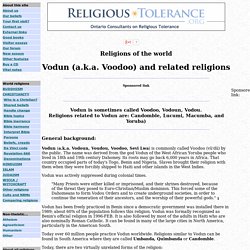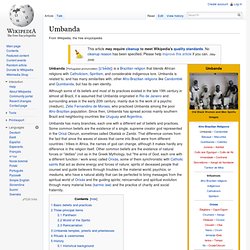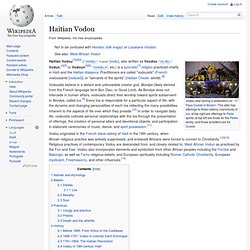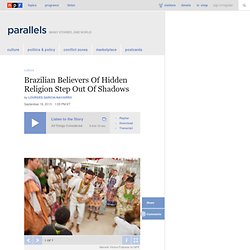

VODUN (and related religions: Candomble, Lucumi, Macumba, Voodoo, Vodoun, & Yoruba) Religions of the world Sponsored link Vodun is sometimes called Voodoo, Vodoun, Vodou.

Religions related to Vodun are: Candomble, Lucumi, Macumba, and Yoruba) General background: Vodun (a.k.a. Vodun was actively suppressed during colonial times. "Many Priests were either killed or imprisoned, and their shrines destroyed, because of the threat they posed to Euro-Christian/Muslim dominion. Vodun has been freely practiced in Benin since a democratic government was installed there in 1989; about 60% of the population follows this religion. Today over 60 million people practice Vodun worldwide. Today, there are two virtually unrelated forms of the religion: History of Vodun in the west: Slaves were baptized into the Roman Catholic Church upon their arrival in Haiti and other West Indian islands. An inaccurate and sensational book (S. Other religions (Macumba, Candomble, Umbanda and Santeria) bear many similarities to Vodun.
Umbanda. Umbanda (Portuguese pronunciation: [ũˈbɐ̃dɐ]) is a Brazilian religion that blends African religions with Catholicism, Spiritism, and considerable indigenous lore.

Umbanda is related to, and has many similarities with, other Afro-Brazilian religions like Candomblé and Quimbanda, but has its own identity. Although some of its beliefs and most of its practices existed in the late 19th century in almost all Brazil, it is assumed that Umbanda originated in Rio de Janeiro and surrounding areas in the early 20th century, mainly due to the work of a psychic (medium), Zélio Fernandino de Moraes, who practiced Umbanda among the poor Afro-Brazilian population.
Since then, Umbanda has spread across mainly southern Brazil and neighboring countries like Uruguay and Argentina. Umbanda has many branches, each one with a different set of beliefs and practices. Some common beliefs are the existence of a single, supreme creator god represented in the Orixá Olorum, sometimes called Obatalá or Zambi. 1. 2. Haitian Vodou. Vodou altar during a celebration for Papa Guédé in Boston.

This altar has offerings to three nations (nanchons) of loa: at top right are offerings to Rada spirits; at top left are those for the Petwo family; and those at bottom are for Guédé. Haitian Vodou[3] (/ˈvoʊduː/, French: [vodu], also written as Voodoo /ˈvuːduː/; Vodun,[4] or Vodoun[4] /ˈvoʊduːn/, etc.) is a syncretic religion practiced chiefly in Haiti and the Haitian diaspora. Practitioners are called "vodouists" (French: vodouisants [voduisɑ̃]) or "servants of the spirits" (Haitian Creole: sèvitè). Vodouists believe in a distant and unknowable creator god, Bondye (likely derived from the French language term Bon Dieu, or Good Lord).
As Bondye does not intercede in human affairs, vodouists direct their worship toward spirits subservient to Bondye, called loa. Names and etymology[edit] Vodou is a Haitian Creole word that formerly referred to only a small subset of Haitian rituals. Beliefs[edit] Deities[edit] Brazilian Believers Of Hidden Religion Step Out Of Shadows : Parallels. Hide caption At a sacred festival day in Sao Paulo, men possessed by orixas — spirits of the gods — dance before getting dressed in orixas costume.

They are participating in an Olubaje party, a Candomblé ritual for cleansing life of bad things and healing. The main god at this party is Omulu, or "the one with straws," the god of life and death who is known for healing diseases. Marcello Vitorino/Fullpress for NPR Hide caption A young practitioner prepares for the party near a wall decorated with sacrificed animal skin and entrails. The animals were ritualistically sacrificed the day before and will be served at the party. Marcello Vitorino/Fullpress for NPR Hide caption Woman prepare food for orixas in the kitchen of the Candomblé temple. Hide caption People serve sacred food at the Olubaje party. Amid chanting and drumming, a crowd gathers in Sao Paulo and waits for the gods to come to them from the spirit world. Those who have been taken over writhe and shout. The History of Santeria: The Afro-Antillian Religion of the Lucumis. Yoruba Deities.